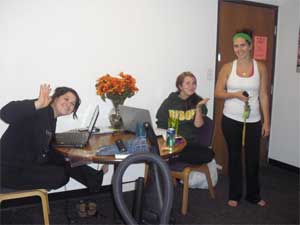
Damage after an earthquake and tsunami at Fukushima Daiichi nuclear plant on March 16, 2011. Photo: REUTERS/DigitalGlobe/Handout
Earlier today we shared an email from Japanese student Kana Igarashi, who attends Santa Monica College in California. She told us about her mother, who is in Fukushima Prefecture, one of the areas hit hard by the earthquake and tsunami, and the site of the nuclear plants that are in danger. Kana’s father, grandparents and sisters are also there.
Kana says her family lives about 80km from the nuclear plants. Currently those within 30km have been told to evacuate or stay inside, but the U.S. embassy has advised Americans to stay at least 80km from the plants.
I spoke to her on the phone this morning to find out more.
On how she heard about the earthquake. I only know me from Fukushima, and my friends know that I’m the only one from Fukushima in this college. Many of my friends called me to call to Japan because they found out that the earthquake hit my area – my prefecture and then the next prefecture, Miyagi Prefecture.
On the first 24 hours and hearing news from her family. I actually was really really worried about it – worried about them. I couldn’t go to sleep. I was just watching the NHK news on the internet. And then I really got scared because my prefecture is really in countryside and I didn’t really expect that many cities I know and then my city is on TV. And then seeing those disasters on TV all the time and then I wasn’t able to talk to my family.
In the daytime everyone tried to call to their family in the north and then the connection is really packed. But still there is some way to contact with them. So what my parents did was woke up like 2 in the morning to call me.”
Read the rest of this entry »
I remember waiting to hear back from New York University (NYU). I applied early decision and was set on living in the city. I was with my dad on the way home from one of my softball games when my brother called and said that he letter had come in the mail. I couldn’t get home fast enough, but I was terrified. I knew that my chances of being accepted were less than great.




 New submissions for our
New submissions for our 



 Kanyakrit (Yu)
Kanyakrit (Yu) Take a Tour Around my Typical American Dorm Room
Take a Tour Around my Typical American Dorm Room 3 Things You Don't Know About Food and Why You Crave it While Living Abroad
3 Things You Don't Know About Food and Why You Crave it While Living Abroad Top 5 Ways Academics in the US Are Different
Top 5 Ways Academics in the US Are Different Why Aren't Americans and International Students Becoming Friends?
Why Aren't Americans and International Students Becoming Friends? How I Made Myself a Good Candidate for US Admissions (and Other Advice from a Successful Applicant)
How I Made Myself a Good Candidate for US Admissions (and Other Advice from a Successful Applicant) On Being an African in the US: Navigating an Endless Set of Stereotypes
On Being an African in the US: Navigating an Endless Set of Stereotypes Staying Safe: A Story No One Should Have to Tell
Staying Safe: A Story No One Should Have to Tell What is the Best University in America?
What is the Best University in America? Disability, Difference and Left-handedness in China and America
Disability, Difference and Left-handedness in China and America Don't Study in the US: A Look at the Pros and Cons
Don't Study in the US: A Look at the Pros and Cons Why You Will Gain 10 Pounds in America (and How to Lose it Again)
Why You Will Gain 10 Pounds in America (and How to Lose it Again) The Truth: Americans Reveal What They Really Think of International Students
The Truth: Americans Reveal What They Really Think of International Students